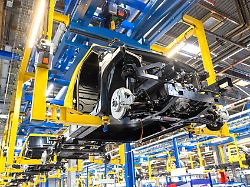“Energy prices are becoming toxic”
VDA sees Germany as a car location under threat
9/4/2023 5:17 am
Before the start of the auto show in Munich, the head of the automobile association VDA talks her frustration with Germany off her chest. The location is not lost yet, but politics is too slow and must now step on the gas massively.
The President of the Association of the Automotive Industry, Hildegard Müller, does not rule out that Germany could fall by the wayside as a location for the industry. The German manufacturers would not lose the race for the future, “the German location would without massive reforms,” said Müller in a joint interview with Microsoft’s Germany boss Marianne Janik. Before the start of the IAA auto show, Müller complained, among other things, of overregulation, political decisions that were too slow and the lack of a legal framework for future topics such as artificial intelligence.
She cited the use of data as an example: “If we restrict this here in Europe, in Germany, that doesn’t mean that it doesn’t happen somewhere in the world.” And it also doesn’t mean that German manufacturers aren’t active elsewhere in the field. “The question is, do we create a political, a regulatory framework here so that we can be competitive and advance internationally.”
Digitization of the automotive industry is accelerating
The main point, however, is “that the location in Germany is dramatically losing its international competitiveness due to the cost structure,” warned Müller. So you have the highest energy costs here. The automotive industry believes that a temporary industrial electricity price is necessary. This should prevent important industries such as battery or semiconductor technology from migrating or not settling in the first place.
Medium-sized suppliers say: “The topic of energy prices is becoming toxic for us.” Investments would no longer be increased in this country, “but they go to other European countries or to the USA”. Microsoft expects the digitalization of the automotive industry to accelerate significantly over the next two to three years, “unlike what we’ve seen in the last 40 years,” said Janik. In addition to artificial intelligence such as the freely formulating ChatGPT dialog system, this includes simulations with which assistance systems can run through various situations.
“Race is just getting started”
The tech group is offering itself to the industry as a “platform provider”. “This platform idea means that we are also breaking down industry boundaries.” Müller criticized that the auto industry was experiencing loss of time and complexities because administration in Germany was not digitized. “Of course there are no easy solutions with AI, with ChatGPT – but they are on the rise, we have to design them now. We can’t say we’ll wait years,” warned the VDA boss. “In the meantime, other regions of the world, which in many respects have better location conditions than we do, will pass us by.”
The industry must invest now and wants to invest 250 billion euros in digitization, among other things, over the next five years. “We cannot and will not wait as an industry, because otherwise we will not achieve the climate targets,” emphasized Müller. “We are now deciding where we will invest in future technologies – and that is why the state must also increase its speed on these issues.” Microsoft manager Janik, who had previously worked for the Mercedes group, among others, emphasized that the race for many future technologies has not yet been decided: “I think it’s really just getting started.” With artificial intelligence, you have the chance to make an innovative leap.
The German auto industry is currently showing the ability to cooperate with the tech industry. “There is enormous potential for CO2 savings in digital mobility solutions,” said Müller. In addition, you will be able to move around more safely, efficiently and comfortably. “We have already developed numerous solutions – we now need the digital infrastructure and the legal framework so that we can implement them.”
